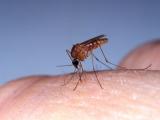Oct 14, 2011 (CIDRAP News) – The National Institutes of Health (NIH) yesterday announced it has awarded contracts, which could total $150 million over 5 years, to four companies to develop broad-spectrum therapies that could help the nation respond to a bioterror attack or other public health emergency.
The contracts, awarded by the NIH's National Institute of Allergy and Infectious Diseases (NIAID), are designed to support the development of promising new therapies toward early clinical studies and, if successful, toward licensure, the NIH said in statement.
NIAID's contracts fit with its strategy for biodefense and emerging disease research that focuses on therapies against classes of pathogens, rather than "one bug, one drug" agent-specific ones. The move toward more broad-spectrum drugs improves preparedness against all infectious disease threats, both naturally produced and deliberately made, the NIH said.
One of the four companies that received the NIH contracts announced its award earlier this week. United Therapeutics announced on Oct 10 that its subsidiary Unither Virology, based in Silver Springs, Md., was awarded a contract of up to $45 million over 5 years to advance a broad-spectrum antiviral drug for dengue and flu based on its "glycobiology" antiviral platform. The award provides an initial $10.6 million over the first three and a half years, with remaining funds to be allocated when the company meets eight milestones.
The company's drug, UV-4, is derived from compounds called iminosugars, which have been approved for other indications such as diabetes and Gaucher's disease and are thought to have the potential to address drug resistance, according to the NIH. The contract is intended to cover toxicity studies, a preliminary safety study, and a phase 2 trial for dengue fever.
Another company that received a contract is CUBRC Inc., based in Buffalo, N.Y., which has partnered with Tetraphase Pharmaceuticals in Watertown, Mass., to develop a fully synthetic tetracycline called TP-271 to treat tularemia and respiratory infections such as community-acquired pneumonia, the NIH said. The initial $5.7 million award could total $35 million over 5 years and covers preclinical safety and efficacy studies, several preliminary clinical trials, and nonclincial trials to assess activity against Bacillus anthracis and Yersinia pestis, the bacteria that cause anthrax and plague infections, respectively.
Entana Pharmaceuticals, based in Watertown, Mass., received an initial $14.3 million award, which could total $43 million over 5 years, to develop new broad-spectrum antibiotics known as bicyclolides. This class of drugs has demonstrated activity against both gram-negative and gram-positive bacteria. Typically, the two different types of bacteria are treated using different drugs.
Cell-culture studies have shown potential activity of these small-molecule anti-infectives against anthrax, plague, and tularemia, and mouse studies suggest efficacy against anthrax and tularemia, according to the NIH. The contract will cover several phase 1 studies to test bicyclolides against several bioterror agents.
XOMA LLC, based in Berkeley, Calif., received a contract to develop an intravenous antitoxin to treat human botulism poisoning, the NIH said. The drug is a monoclonal antibody that targets Clostridium botulinum neurotoxin serotypes C and D and neutralizes C/D and D/c mosaic/hybrid toxins. The monoclonal antibodies would replace existing horse-based antitoxin products that are difficult to make and pose safety concerns. The initial award is worth $7 million and could grow to $28 million over the next 5 years.
See also:
Oct 13 NIH press release
Oct 11 CIDRAP News Scan



















